This article needs to be updated.(April 2015) |
 | |
Botswana | United States |
|---|---|
According to the 2012 U.S. Global Leadership Report, 79% of Botswana people approve of U.S. leadership, with 8% disapproving and 13% uncertain. [1]
This article needs to be updated.(April 2015) |
 | |
Botswana | United States |
|---|---|
According to the 2012 U.S. Global Leadership Report, 79% of Botswana people approve of U.S. leadership, with 8% disapproving and 13% uncertain. [1]

The United States considers Botswana an advocate of and a model for stability in Africa and has been a major partner in Botswana's development since its independence. The U.S. Peace Corps returned to Botswana in August 2002 with a focus on HIV/AIDS-related programs after concluding 30 years of more broadly targeted assistance in 1997. Similarly, the USAID phased out a longstanding bilateral partnership with Botswana in 1996, after successful programs emphasizing education, training, entrepreneurship, environmental management, and reproductive health. Botswana, however, continues to benefit along with its neighbors in the region from USAID's Initiative for Southern Africa, now based in Pretoria, and USAID's Southern Africa Global Competitiveness Hub, headquartered in Gaborone. The United States International Board of Broadcasters (IBB) operates a major Voice of America (VOA) relay station in Botswana serving most of the African continent.
In 1995, the Centers for Disease Control (CDC) started the BOTUSA Project in collaboration with the Botswana Ministry of Health in order to generate information to improve tuberculosis control efforts in Botswana and elsewhere in the face of the TB and HIV/AIDS co-epidemics. Under the 1999 U.S. Government's Leadership and Investment in Fighting an Epidemic (LIFE) Initiative, CDC through the BOTUSA Project has undertaken projects and has assisted organizations in the struggle against the HIV/AIDS epidemic in Botswana. Botswana is one of the 15 focus countries for PEPFAR, the President's Emergency Plan for Aids Relief, and has received more than $556 million since the program began in January 2004 through September 2011. PEPFAR assistance to Botswana, which totaled $84.4 million in FY 2011, is contributing to HIV/AIDS prevention, treatment, and care interventions.

The Governments of Botswana and the United States entered into an agreement in July 2000 to establish an International Law Enforcement Academy (ILEA) in Gaborone. The academy, jointly financed, managed and staffed by the two nations, provides training to police and government officials from across the Sub-Saharan region. The academy's permanent campus, in Otse outside of Gaborone, opened March 2003. Over 3,000 law enforcement professionals from Sub-Saharan Africa have received training from ILEA since it began offering classes in 2001.
The U.S. Embassy is in Gaborone. OSC (previously ODC) is located at the embassy. CDC is located on Ditlhakore Way in Gaborone. ILEA is located in Otse, about 30 minutes outside of Gaborone. The IBB station is located in Selebi-Phikwe, about 400 kilometers northeast of Gaborone.

The United States President's Emergency Plan For AIDS Relief (PEPFAR) is a United States governmental initiative to address the global HIV/AIDS epidemic and help save the lives of those suffering from the disease. Launched by U.S. President George W. Bush in 2003, as of May 2020, PEPFAR has provided about $90 billion in cumulative funding for HIV/AIDS treatment, prevention, and research since its inception, making it the largest global health program focused on a single disease in history until the COVID-19 pandemic. PEPFAR is implemented by a combination of U.S. government agencies in over 50 countries and overseen by the Global AIDS Coordinator at the United States Department of State. As of 2023, PEPFAR has saved over 25 million lives, primarily in sub-Saharan Africa.

The global epidemic of HIV/AIDS began in 1981, and is an ongoing worldwide public health issue. According to the World Health Organization (WHO), by 2023, HIV/AIDS had killed approximately 40.4 million people, and approximately 39 million people were infected with HIV globally. Of these 29.8 million people, 75% are receiving antiretroviral treatment. There were about 630,000 deaths from HIV/AIDS in 2022. The 2015 Global Burden of Disease Study estimated that the global incidence of HIV infection peaked in 1997 at 3.3 million per year. Global incidence fell rapidly from 1997 to 2005, to about 2.6 million per year. Incidence of HIV has continued to fall, decreasing by 23% from 2010 to 2020, with progress dominated by decreases in Eastern Africa and Southern Africa. As of 2020, there are approximately 1.5 million new infections of HIV per year globally.
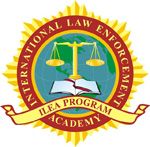
International Law Enforcement Academies (ILEAs) are international police academies administered by the U.S. Department of State where U.S. law enforcement can instruct local police from participating countries in counterterrorism, narcotics interdiction, detection of fraudulent documents, and border control practices. They were established in 1995 by US President Clinton as a means of bringing together international law enforcement to reduce crime, combat terrorism, and share in knowledge and training.
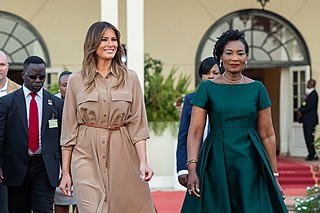
{{Use American English {date=February 2022}}

The diplomatic relationship between the United States of America and Zambia can be characterized as warm and cooperative. Relations are based on their shared experiences as British colonies, both before, after and during the struggle for independence. Several U.S. administrations cooperated closely with Zambia's first president, Kenneth Kaunda, in hopes of facilitating solutions to the conflicts in Rhodesia (Zimbabwe), Angola, and Namibia. The United States works closely with the Zambian Government to defeat the HIV/AIDS pandemic that is ravaging Zambia, to promote economic growth and development, and to effect political reform needed to promote responsive and responsible government. The United States is also supporting the government's efforts to root out corruption. Zambia is a beneficiary of the African Growth and Opportunity Act (AGOA). The U.S. Government provides a variety of technical assistance and other support that is managed by the Department of State, U.S. Agency for International Development, Millennium Challenge Account (MCA) Threshold Program, Centers for Disease Control and Prevention, Department of Treasury, Department of Defense, and Peace Corps. The majority of U.S. assistance is provided through the President's Emergency Plan for AIDS Relief (PEPFAR), in support of the fight against HIV/AIDS.
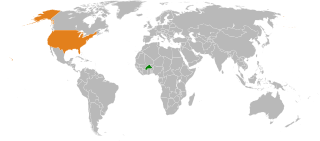
Relations between Burkina Faso and the United States are good but has been subject to strains in the past because of the Compaoré government's past involvement in arms trading and other sanctions-breaking activity.

Grenada – United States relations are bilateral relations between Grenada and the United States. The United States recognized Grenada on the 7 February 1974, as the same day as Grenada got independence from the United Kingdom of Great Britain and Northern Ireland. These nations formally established diplomatic relations on 29 November 1974.
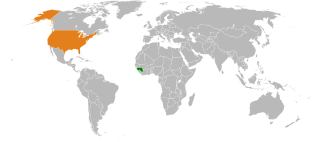
Guinea – United States relations are bilateral relations between Guinea and the United States.
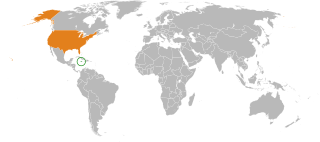
The United States maintains close and productive relations with Jamaica.

Mali-United States relations, while historically friendly, were radically altered by the March 2012 military coup in Mali that ousted the previous democratic government. The Mali government was a strong partner with the U.S. in its efforts to combat violent extremists, but the United States officially suspended military relations with Mali following the military coup.

Mozambique – United States relations are bilateral relations between Mozambique and the United States.
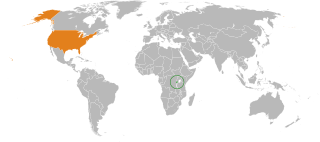
Rwanda–United States relations are bilateral relations between Rwanda and the United States.

Senegal–United States relations are bilateral relations between Senegal and the United States.

Eswatini–United States relations are bilateral relations between Eswatini and the United States.
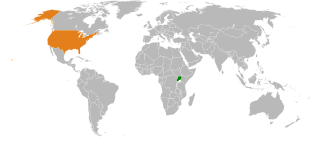
Uganda – United States relations are bilateral diplomatic, economic, social and political relations between Uganda and the United States.
The Botswana Police College is located in Otse in the South East District. An ultra-modern new college campus for meeting the training needs of the Botswana Police Service was designed by FMA Architects Ltd, constructed by Stocks Building Africa and completed in 2000 at a cost of 230 million Pula.
Angola has a large HIV/AIDS infected population, however, it has one of the lowest prevalence rates in the Southern Africa zone. The status of the HIV/AIDS epidemic in Angola is expected to change within the near future due to several forms of behavioral, cultural, and economic characteristics within the country such as lack of knowledge and education, low levels of condom use, the frequency of sex and number of sex partners, economic disparities and migration. There is a significant amount of work being done in Angola to combat the epidemic, but most aid is coming from outside of the country.
Orphans and vulnerable children is a term used to identify the most at-risk group among young people in contexts such as humanitarian aid and education in developing countries. It often used relating to countries in sub-Saharan Africa with a high number of AIDS orphans.
The President's Malaria Initiative (PMI) is a U.S. Government initiative to control and eliminate malaria, one of the leading global causes of premature death and disability. The initiative was originally launched by U.S. president George W. Bush in 2005, and has been continued by each successive U.S. president.

Deborah Leah Birx is an American physician and diplomat who served as the White House Coronavirus Response Coordinator under President Donald Trump from 2020 to 2021. Birx specializes in HIV/AIDS immunology, vaccine research, and global health. Starting in 2014, she oversaw the implementation of the President's Emergency Plan for AIDS Relief (PEPFAR) program to support HIV/AIDS treatment and prevention programs in 65 countries. From 2014-2020, Birx was the United States global AIDS coordinator for presidents Barack Obama and Donald Trump and served as the United States special representative for global health diplomacy between 2015 and 2021. Birx was part of the White House Coronavirus Task Force from February 2020 to January 2021. In March 2021, Birx joined ActivePure Technology as Chief Medical and Science Advisor.
![]() This article incorporates public domain material from U.S. Bilateral Relations Fact Sheets. United States Department of State.
This article incorporates public domain material from U.S. Bilateral Relations Fact Sheets. United States Department of State.
![]() Media related to Relations of Botswana and the United States at Wikimedia Commons
Media related to Relations of Botswana and the United States at Wikimedia Commons